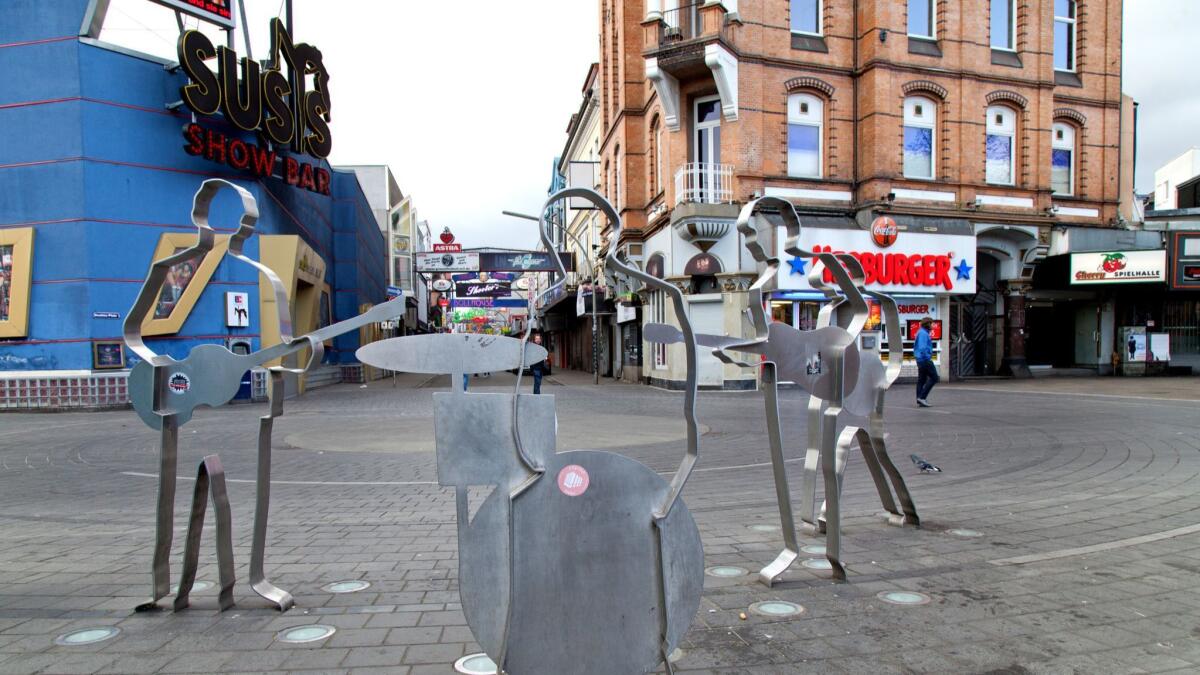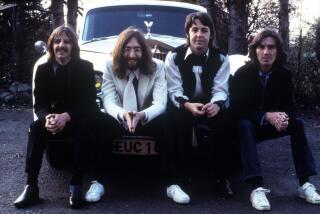Forget Liverpool. Hamburg, Germany, made the Beatles into the band they became
Reporting from Hamburg, Germany — At the tender age of 8, I knew the Beatles were extraordinary. In their appearance on “The Ed Sullivan Show,” they sang and played effortlessly, their timing perfect despite rarely looking at one another.
Like thousands of others, I basked in that black-and-white glow on that Sunday night in February 1964, but when it was over, I had a burning question: How did they do that?
I recently had the chance to find out. On a business trip to Germany, I spent three days in St. Pauli, the Hamburg district where the Beatles became really good before they became really, really famous.
My expert guide: Peter Paetzold, a bearded 68-year-old with the street cred of a chain-smoking rock drummer, well versed about St. Pauli’s music scene of the 1960s. He grew up around the corner from the Indra club, one of four venues the group played.
In August 1960, when the Beatles arrived, the Indra was a seedy strip joint complete with a neon-lighted elephant beckoning passersby. The band’s contract required the five of them (John, Paul, George, drummer Pete Best and bassist Stuart Sutcliffe) to perform for 30 hours, six nights a week. Each one received the generous sum of 30 Deutsche marks a week, about $51 in those days.
“We had to learn millions of songs because we’d be on for hours,” George Harrison later said. “Hamburg was really like our apprenticeship, learning how to play in front of people.”
The Indra’s owner provided the group free lodging. On my private tour, Paetzold and I crossed the street to the entrance of those accommodations, the back door of the Bambi, a movie theater. The Beatles slept behind the screen in two dark, dank, cramped storage rooms with small beds, folding cots and a couch. The nearby men’s room, where broken toilets sometimes overflowed into their rooms, served the group’s personal hygiene needs.
‘Oh-my-gosh’
As we stood outside the back entrance of the Bambi, Paetzold removed a photo from an envelope, a black-and-white image of John Lennon taken in 1960 at the theater. The singer is reading a newspaper and wearing only a cap, sandals and white briefs. It marked one of my “oh-my-gosh” moments in St. Pauli.
There were many more OMG moments the previous night.
It’s hard to imagine anyone in Hamburg more effusive about the Beatles than Stefanie Hempel. She conducts walking tours, performs the group’s music on a ukulele and is a cultural ambassador for the city. She is organizing a celebration in September of the “Abbey Road” album with a band and orchestra.
Hempel vividly remembers the moment — she was 9 — when she first heard “She Loves You” on a cassette tape her father had acquired surreptitiously in the 1980s because rock music was verboten in East Germany. “It was the moment of my life,” she said.
She often is asked what it was like for the Beatles playing small, noisy, smoke-filled clubs in Hamburg.
“It was a very tough time for them, but it was the wildest time of their lives,” she said, an allusion, I think, to the musicians’ introduction to prostitutes and “prellies,” the nickname for Phenmetrazine, a stimulant.
“They were never again as free as they were in Hamburg,” she said. “As John Lennon said, ‘We could try anything and the audience liked it, as long as it was really loud.’ ”
Magical musical tour
I joined Hempel and 30 others on her weekly Saturday evening musical tour, more magical than mysterious, through St. Pauli’s red-light district. Her clients have included Bob Dylan, Steve Winwood and John Lennon’s half-sister, Julia.
Hempel’s three-hour excursion, now in its 15th year, includes a stop at the site of the Star-Club, where the Beatles and other musical icons, including Bill Haley and Jimi Hendrix, performed in the 1960s. The venue closed in 1969; it was destroyed 18 years later in a fire.
After leading us in a robust sing-along of “Twist and Shout,” Hempel walked us to Beatles-Platz, a circular plaza with five metal silhouettes, a tribute to the pre-Fab Four. Names of their songs (in English), from “My Bonnie,” recorded in Hamburg in 1961 with singer Tony Sheridan, to “The Long and Winding Road,” are incised in the ground representing the grooves of a record.

The plaza is the city’s only public recognition of the group, and I wondered why Hamburg had not capitalized on this extraordinary musical legacy,
“They spent their time in a very sleazy area, and it is still that way,” said British radio broadcaster Spencer Leigh, author of “The Beatles in Hamburg.” “If Hamburg were to clean up the area, they presumably would be turning away profitable enterprises ... a real conundrum.”
Carsten Brosda, head of Hamburg’s office of culture and media, contends the Beatles’ legacy lives on in the annual Reeperbahn Festival, four days in September when rock, pop, folk, soul and jazz abound in clubs and blocked-off streets. The name refers to the half-mile main boulevard in the heart of the red-light district.
“It’s grown to become one of the most important European music festivals,” Brosda said. “So you could say that the lively music culture in this part of town is one of the best commemorations of the Beatles and the long tradition of music around the Reeperbahn.”
Vintage market
That lively culture extends beyond the Reeperbahn. A short walk led me to the waterfront district where the promenade along the Elbe River is filled with locals and tourists. The crowd was almost shoulder to shoulder on a Sunday morning as they converged on the Hamburg Fish Market, which dates back more than 300 years.
I was not shopping for cod, flowers or fresh fruit and vegetables. Rather, I was admiring the street artists and buskers, some of whom may have their sights on this year’s Reeperbahn Festival (Sept. 18-21).
Another St. Pauli tradition, although not three centuries old, is the Flohschanze, a Saturday flea market that was a 15-minute walk from my hotel. With my “find,” an Art Deco picture frame from the 1920s, I strolled around the corner to two more Beatles landmarks.
Musik Rotthoff is crammed to the ceiling with Gibson, Fender and other brands of guitars. Claus-Dieter Rotthoff is the third-generation proprietor of this family business. In 1961, his father sold Paul McCartney the stylish violin-shaped Hõfner bass guitar the singer played in concert and in recording studios throughout the 1960s.
The shop is adjacent to Hotel Pacific, where in December 1962 the four Beatles, now with Ringo Starr on drums, stayed two weeks, each with his own room. The group closed its pre-Beatlemania Hamburg run, which totaled more than 1,100 performance hours on five trips from Liverpool, with a New Year’s Eve show in 1962.
Eleven days later, “Please Please Me,” which record producer George Martin accurately predicted would be the group’s first No. 1 hit, was released in Britain. A little more than a year later, the Beatles played “The Ed Sullivan Show.”
If you go
The best way to Hamburg, Germany
From LAX, Lufthansa, KLM, Air France, Austria, British, United and Delta offer connecting service (change of planes) to Hamburg. Restricted round-trip fare from $1,070, including taxes and fees.
Telephones
To call the numbers below from the United States, dial 011 (the international calling code), 49 (the country code for Germany) and the local number.
What to do
Peter Paetzold, pp2014hamburg@gmail.com
Hempel’s Beatles-Tour, 6 p.m. Saturdays, April-November. About $40 for a 2½- to three-hour tour.
Where to stay
Ibis Budget Hamburg St Pauli Messe, 64 Simon-von-Utrecht-Strasse, Hamburg, Germany; 40-31765620. Doubles from $94, breakfast included
Hotel Pacific, 30-31 Neuer Pferdemarkt, Hamburg, Germany; 40-4395095. Doubles with private baths from $100.
Arcotel Onyx Hamburg, 1a Reeperbahn, Hamburg, Germany; 40 2094090. Doubles from $170 a night.
Where to eat
Captain’s Dinner Restaurant and Cafe, St. Pauli Landungsbrücken, bridge 3; Hamburg, Germany; 40-312121. Lovely waterfront setting overlooking the Elbe River; several fish entrees. Dinner for two from $80.
Freudenhaus St. Pauli, 7-9 Hein-Hoyer-Strasse, Hamburg, Germany; 40-314642. Elegant dining just off the infamous Reeperbahn. Nice array of veal, pork and other “sinful meats.” Dinner for two, $100.
It’s Like Kandie, 16 Wohlwillstrasse, Hamburg, Germany. Specializing in dessert waffles; a two-minute walk from the John Lennon “doorway,” featured on the cover of his 1975 “Rock ’n’ Roll” album.
To learn more
Contact the Hamburg tourism office.
More to Read
Sign up for The Wild
We’ll help you find the best places to hike, bike and run, as well as the perfect silent spots for meditation and yoga.
You may occasionally receive promotional content from the Los Angeles Times.






